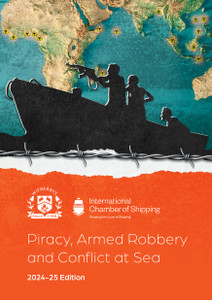
BMP5: Best Management Practices to Deter Piracy and Enhance Maritime Security in the Red Sea, Gulf of Aden, Indian Ocean and Arabian Sea
This publication will help ship operators, Masters and mariners prepare for external threats to safety in the Red Sea, Gulf of Aden, Indian Ocean and Arabian Sea. It is jointly authored by shipping industry organisations and supported by military organisations. It complements guidance on piracy in the latest IMO MSC circulars, but also addresses threats specific to the region. The publication is free to download.
This edition of BMP is written primarily for oil tankers and gas carriers, but much of the guidance will be applicable to other types of ship. Its contents have been reordered to reflect the latest risk assessment, planning, reporting and mitigation process. Transit corridors and reporting procedures have been reviewed and emphasis is placed on the role of the mariner in reporting suspicious activity to the UKMTO.
Seafarers have encountered different security threats when operating ships in the Red Sea, the Gulf of Aden, the Indian Ocean and the Arabian Sea.
The purpose of this publication is to help ships plan their voyage and to detect, avoid, deter, delay and report attacks. Experience has shown that application of the recommendations in this publication makes a significant difference to the safety of seafarers.
Piracy specific Best Management Practice (BMP), international navies and capacity building ashore have helped to suppress piracy. However, Somali piracy has not been eradicated and remains a threat.
The BMP contained in this publication mitigates the risk from piracy and other maritime security threats.
Regional instability has introduced other maritime security threats, including:
- Deliberate targeting of ships by extremist groups
- collateral damage arising from regional conflict.
BMP
piracy
measures
are
effective,
but
differences
in
attack
methods
from
other
threats
may
require
other
forms
of
mitigation.
For
example,
attacks
carried
out
by
extremists
may
be
more
determined,
as
they
may
be
willing
to
risk
their
lives.
The
consequences
of
not
adopting
effective
security
measures
can
be
severe.
Some
pirates
have
subjected
hostages
to
violence
and
other
ill
treatment
and
periods
of
captivity
for
some
hijacked
seafarers
have
lasted
for
several
years.
Other
attacks
have
demonstrated
an
intent
to
damage
ships
and
endanger
life.
The
United
Kingdom
Maritime
Trade
Operations
(www.ukmto.org)
and
Maritime
Security
Centre
–
Horn
of
Africa
(www.mschoa.org)
websites
should
be
consulted
for
advice.
The Fundamental Requirements of BMP
Section 1 Introduction
Section 2 The Threat
Section 3 Threat and Risk Assessment
Section 4 Planning
Section 5 Ship Protection Measures
Section 6 Reporting
Section
7
Ships
Under
Attack
Annex A Contact Details
Annex B Maritime Security Charts
Annex C Common Understanding
Annex D UKMTO Reporting Forms
Annex E Maritime Security Centre – Horn of Africa Reporting Forms
Annex F Additional Guidance for Vessels Engaged in Fishing
Annex G Additional Advice for Leisure Craft, including Yachts
Annex H Definitions and Abbreviations
Annex I Supporting Organisations
BIMCO
BIMCO
is
the
world’s
largest
direct-membership
organisation
for
shipowners,
charterers,
shipbrokers
and
agents.
In
total,
around
60%
of
the
world’s
merchant
fleet
is
a
BIMCO
member,
measured
by
tonnage
(weight
of
the
unloaded
ships).
The
organisation
has
NGO
status
and
is
based
in
Copenhagen,
Denmark,
with
offices
in
Athens,
Singapore
and
Shanghai.
With around 1900 member companies across 120 countries – from the largest shipowners in the world to small local port agents and law firms, BIMCO represents a wide range of maritime companies and organisations.
BIMCO’s goal is to secure a level playing field for the global shipping industry. BIMCO therefore works to promote and secure global standards and regulations for the maritime sector. The organisation’s century long effort into creating standard contracts and clauses is an expression of that aim.
ICS
The
International
Chamber
of
Shipping
(ICS)
is
the
principal
international
trade
association
for
the
shipping
industry,
representing
shipowners
and
operators
in
all
sectors
and
trades.
ICS
membership
comprises
national
shipowners'
associations
in
Asia,
Europe
and
the
Americas
whose
member
shipping
companies
operate
over
80%
of
the
world's
merchant
tonnage.
Established
in
1921,
ICS
is
concerned
with
all
technical,
legal,
employment
affairs
and
policy
issues
that
may
affect
international
shipping.
ICS
represents
shipowners
with
the
various
intergovernmental
regulatory
bodies
that
impact
on
shipping,
including
the
International
Maritime
Organization.
ICS
also
develops
best
practices
and
guidance,
including
a
wide
range
of
publications
and
free
resources
that
are
used
by
ship
operators
globally.
https://www.ics-shipping.org/about-ics/about-ics
IGP&I
Clubs
The
thirteen
P&I
Clubs
which
comprise
the
International
Group
(the
“Group”)
between
them
provide
marine
liability
cover
(protection
and
indemnity)
for
approximately
90%
of
the
world's
ocean-going
tonnage.
https://www.igpandi.org/about
INTERTANKO
INTERTANKO (the International Association of Independent Tanker Owners) is a trade association that has served as the voice for independent tanker owners since 1970, representing the interests of its Members at national, regional and international levels.
The organisation champions an industry dedicated to support global energy networks by delivering safe, efficient and environmentally sound transport services.
INTERTANKO actively works on a wide range of operational, technical, legal and commercial issues affecting tanker owners and operators around the world. It draws on regular and direct contact with its Members and other industry stakeholders to develop and disseminate information and best practice, essential to the tanker industry.
https://www.intertanko.com/About-Us/
OCIMF
The
Oil
Companies
International
Marine
Forum
(OCIMF)
is
a
voluntary
association
of
oil
companies
with
an
interest
in
the
shipment
and
terminalling
of
crude
oil,
oil
products,
petrochemicals
and
gas.
OCIMF
focuses
exclusively
on
preventing
harm
to
people
and
the
environment
by
promoting
best
practice
in
the
design,
construction
and
operation
of
tankers,
barges
and
offshore
vessels
and
their
interfaces
with
terminals.
Learn
more
at
www.ocimf.org
- Number of Pages:
- 0
- Published Date:
- August 2018
- Binding Format:
- Paperback
- Book Height:
- 0 mm
- Book Width:
- 0 mm
- Author:
BIMCO, ICS, IGP&I Clubs, INTERTANKO and OCIMF
- Free eBook:
- Download here
- Publication Date:
- January 2021



